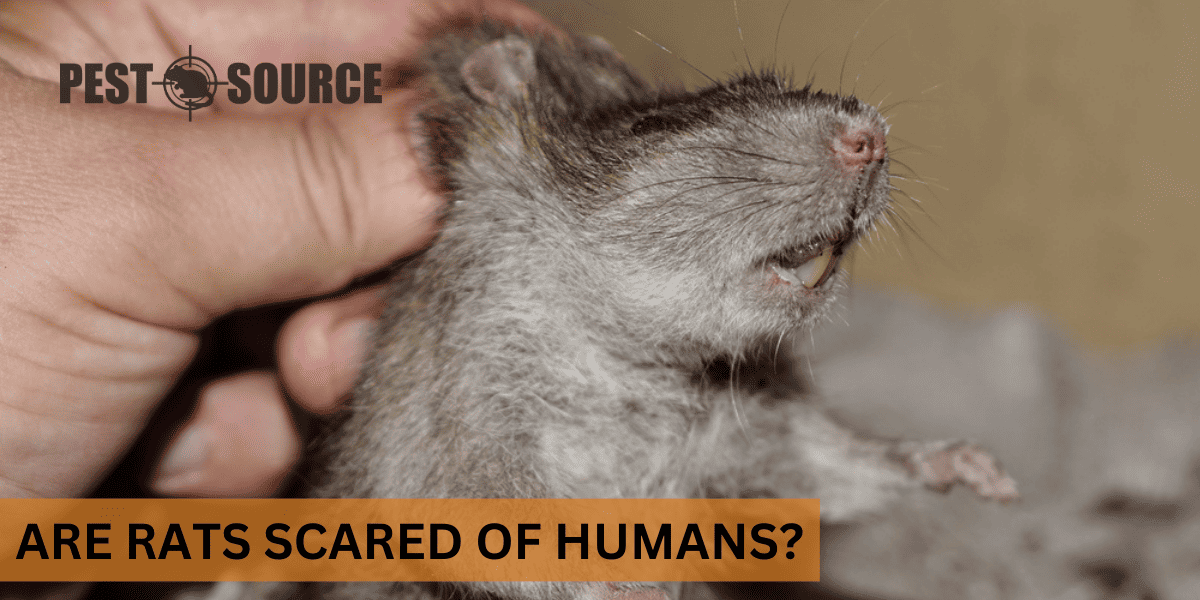Rats are typically wary of humans and tend to avoid direct contact, exhibiting a natural fear of larger, unknown beings. This post will delve into the behavior of rats around humans, discussing why they are generally scared and how they react in human-dominated environments. Understanding rats’ fear of humans is important for both managing infestations and considering humane control methods.
POINTS
- Rats are instinctively wary of humans, but their level of fear can decrease with habitual exposure, particularly in urban areas where they may become bolder due to regular contact and availability of food sources.
- Rat attacks on humans are rare and usually occur as defensive actions rather than aggression; however, rat bites can pose serious health risks, including bacterial and viral infections.
- Rats are omnivores with a natural diet consisting of seeds, grains, fruits, and insects; the notion that they would hunt or eat humans is a myth, and they typically only consume human food waste when available.
- Urban rats tend to be less fearful of humans and may become a nuisance by seeking food in human dwellings, while wild rats are more elusive and maintain a greater distance from humans.
- Effective pest control involves preventing access to food and shelter for rats, which includes securing food sources and sealing entry points to deter rat infestations and minimize the risk of disease transmission.
Understanding Rat Behavior in Human Presence
Rats are instinctively wary of humans and other potential threats. This fear is a survival mechanism that helps them avoid danger. However, the level of fear rats exhibit can be influenced by several factors, including their experiences and the environment they inhabit. For instance, rats that have had limited interaction with humans may be more skittish, while those that live in close proximity to human populations, such as in urban areas, may display less fear due to habituation.
Factors Influencing Rat Fear or Boldness
Several environmental variables can affect a rat’s fear or boldness around humans:
- Exposure to humans: Rats that frequently encounter humans may become less fearful over time.
- Availability of food: Rats may risk closer contact with humans in areas where food sources are abundant.
- Habitat: Rats in rural areas might be more fearful than those in cities due to different exposure levels to human activity.
Fear-Driven Behaviors vs. Less Fearful Actions
In different settings, rats can exhibit a range of behaviors from fear-driven to bold:
- Urban environments: Rats are often bolder, scavenging for food even with humans nearby.
- Rural or wild settings: Greater fearfulness can be observed, with rats being more cautious and elusive.
Rat Aggression and Defensive Behaviors: From Bites to Attacks
Investigating Rat Attacks on Humans
Rat attacks on humans are relatively rare and typically occur as defensive actions rather than outright aggression. Rats may bite people if they feel threatened or cornered. It’s important to distinguish between a rat defending itself and one initiating an attack without provocation.
Health Risks Associated with Rat Bites
Rat bites can pose several health risks, including:
- Bacterial infections: Such as rat-bite fever.
- Viral diseases: Including Hantavirus, which can be transmitted by rodents.
- Tetanus: If the wound is not properly cleaned and treated.
Scenarios of rats biting humans in their sleep are uncommon but can occur, especially in areas with large infestations.
Why Rats Might Chase or Run Towards Humans
Rats may chase or run towards humans for a few reasons:
- Defensive behavior: A rat might run towards a person as a bluff charge to create an escape route.
- Curiosity: Rats are intelligent and may approach humans out of curiosity, especially if they smell food.
- Mistaken actions: In rare cases, a rat might mistake a part of a sleeping human for food, leading to a bite.
Rats’ Dietary Habits and Predatory Behavior: Assessing the Threat to Humans
Examining the Natural Diet of Rats
Rats are omnivores, meaning their diet in the wild consists of a variety of foods including seeds, grains, fruits, insects, and occasionally small animals. The idea that rats would attack and eat humans is a myth. Rats prefer to scavenge for their food and will typically only consume human food waste when it’s available, rather than hunting for it.
Do Rats Hunt or Eat Other Animals?
While it’s not common for rats to hunt larger animals, they are opportunistic feeders and may prey on:
- Small birds: Especially young or injured ones that are easy to catch.
- Insects: A significant part of their diet.
- Rodents: In some cases, rats may exhibit cannibalistic behavior, particularly in overpopulated or stressful conditions.
Rare Scenarios of Rats Causing Serious Harm to Humans
It’s extremely rare for rats to cause serious harm or death to humans. Most stories are either myths or extreme cases where other contributing factors were involved. The actual risk of a rat directly harming a human is very low. However, the indirect risks, such as diseases spread by rat infestations, are more significant.
Rats in Urban vs. Wild Environments: Varying Levels of Fear and Aggression
Comparing Rat Behaviors in Different Environments
Rat behavior can vary significantly between urban and wild environments:
- Urban rats: Tend to be less fearful of humans due to regular exposure and may become a nuisance by seeking food in human dwellings.
- Wild rats: Are usually more elusive and display greater fear of humans, keeping their distance whenever possible.
Influence of Urbanization on Rat Behavior
Urbanization has a profound impact on rat behavior:
- Reduced fear: Constant exposure to humans and noise reduces the innate fear rats have of people.
- Increased aggression: In densely populated areas with fierce competition for resources, rats may become more aggressive towards each other and, in rare cases, towards humans.



